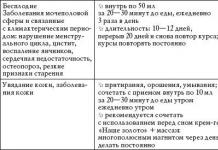Every time I am approached by the mother of a teenage boy who doesn't want to go to school, or the mother of a teenage girl who is told by her dad that "he doesn't love her!", I ask the same question: "What's between you parents? » The answer is given reluctantly and slightly with irritation: what does it have to do with it, you did not understand the essence of the question: “Nothing. We're separated." Or like this: “Everything is fine with us!”
I don’t let up: “And how do you feel about him, your husband?” “Yes, I have nothing to do with him! Why are you asking about this? And what does this have to do with my question?
Yes, the most direct! As long as you don’t care why you treat him, your ex or current husband in any way, your son will study poorly, and your daughter can hear from her father what she hears.
Because it doesn’t happen that when you make someone an empty place for yourself, when you make someone an “insensitive stool” that cannot have experiences, then in return you get something else. You throw contempt, indifference, arrogance, superiority, anger, desire to sting. Every word you say to him is poison.
And in return you want love, money, attention, care, patronage, protection. No, no, of course not for yourself! For a child! Everything for the child! From a person in whose direction there is only poison and contempt, and who most often does not even want to be considered a person. This is not an equal exchange. That doesn't happen.
In return, you receive only what comes from you. If you do not understand that it hurts - your ignoring or bile in words.
If you don’t want to think about it, delve into it, analyze it, change it, then they will hurt you too. If you don't stop, it will hurt you even more. Through a child.
In most cases, ignoring a common child, his feelings is a mirroring of the relationship of the mother of the child to his father.
The mother does not want to hear this and deal with it. She wants to convict, blame, re-educate, call for conscience. She does exactly what her mother used to do or does. In relation to her husband. Blames, accuses, complains about him. She repeats what she saw and heard in her childhood.
It is a theme of devotion to one's own mother, who either explicitly or implicitly hated her husband. It comes from one's own parental family, where there was a lot of indirect aggression. Constantly. Between man and woman.
All other situations in an adult daughter are pulled up just to continue this. Hatred for a man. Mistrust. Suspicion. Contempt. All other situations are just to find confirmation.
All roles have long been registered. How she should behave, how he should behave. The script was already ready. It just needed to be implemented.
You have to look at the script. And not on the behavior of an individual man. Or the behavior of an individual child. The answers are all in the script. And the dialogues are like a blueprint.
As long as there is a desire to remake and re-educate a husband, former or current, to continue to persecute him, to bring him to clean water, it is impossible to help children. And in the far corners of their memory, all the dialogues are already recorded. It remains only for them to grow up a little and embody what was before them. Between man and woman.
And in general, everything that happens to the child next, a difficult personal or professional life, many types of addictions - this will be his longing for his father. The father, whom he, the child, did not have enough. Not because the parents were divorced, but because the father was ignored all the time, persecuted, rejected, belittled, argued, showed that he was unworthy, and he, the father, had to move away. Nature does not tolerate emptiness. Where there should be a father - emptiness. And instead of the father, destructiveness and problems appear.
Everything starts with the mother. Look at how a father treats children and you will find out how women in this family treat men. Not how they say it, but what is in their hearts. In relation to her husband. Former. Or the current one.
Read related:
| 
Boleslav Hupka
There are no ideal fathers (remember what Jesus had to experience because of his wayward dad). We think you are no exception to the rule. However, the saddest thing in this situation is that you may not know that the teacher did not work out of you. It is as difficult for an ordinary parent to notice mistakes in his own manner of upbringing as it is for a vampire to find a pimple on his forehead with the help of a mirror. Often, any difficulties that arise in the relationship between adults and children are interpreted as incorrect behavior of the child. To stop shifting the blame onto fragile children's shoulders and understand what mistakes you are prone to in the process of upbringing, find yourself by special signs among 5 parenting stereotypes. Note that one stereotype does not exclude the other. You can be, for example, "the ever-disgruntled authoritarian bodyguard father."
To explain what you are wrong about and give you instructions on what to do now, we asked our permanent consultant, Leading Specialist of the Center for Family Psychology "We", Candidate of Psychological Sciences Tatyana Sviridova.
Special signs
Such a father is almost impossible to please. (“Dad, dad! I found a gold nugget the size of a horse's skull!” - “Where are the shoes on the carpet ?!”) “Such a rejection of one's own child usually works on a deep subconscious level,” says Ms. Sviridova. “Even if this is not expressed in reproaches expressed aloud, the father still unconsciously worries that his child is weaker and less successful than other children.” The habit of evaluating a child according to his far-fetched standards leads to the fact that even his real successes will go unnoticed. For example, for a hypothetical dad-athlete of this variety, the first place in the horn competition, which was taken by his squishy son, means absolutely nothing. After all, this deadhead can’t even pull himself up three times! Especially holding your precious horn in your teeth.
All in father
The rejected child grows up with low self-esteem. “He cannot show independence, because he is not confident in his own abilities,” our consultant explains this pattern. In addition, such a stereotype of upbringing can lead to stubbornness and other childish varieties of disobedience. Not receiving father's love, the child begins to deliberately behave in such a way as to anger the parent: "Since I'm so bad, then here's to you!"
On the path to recovery
Of all the five "wrong" types described, this is the most difficult to correct. Parental love is blind and, in principle, works indefinitely without additional nourishment. Only a professional psychologist will accurately help to find out the reason for the deviation from the genetic given. The origins are very different: they can lie in the childhood of a father who was also rejected by his parents, in an existing marriage entered into because of a "flight", in suppressed suspicions that the child is "not yours", etc. If you fell into this category of fathers, try to look at your behavior from the outside. Literally. Let the camera record everything that happens at home: family breakfast, joint games. “Since rejection often works on an unconscious level, watching the recording will help you not only document the unpleasant truth that you are rejecting a child, but also, perhaps, understand why you are irritated,” says Tatyana.
Special signs
When the "bodyguard" talks about his child, he does not hesitate to use the word "we" and its derivatives. (“We have a temperature”, “We will go to school soon”, “We crap one's pants again today, well, more precisely, just me, ha ha.”) Such a father considers his life only in the context of a child: he does not just earn money - he works for the future of his heir. “In psychology, this is called a “symbiotic relationship.” They tend to people who do not feel the boundaries of another person. For a symbiotic, a child is a continuation of the father's personality, who does not understand that his child is a separate creature with his own interests and characteristics, ”explains Tatiana. If there was some kind of incident with teachers or classmates at school, the “bodyguard” will run to sort it out, as he perceives what happened as a personal drama.
All in father
As a result of such overly close contacts of the symbiotic species, the child depends on the mood of the adult. If the father is sad, the son will be sad too. (“No, I won’t let you and the guys go out into the yard. We will sit together in a dark room, staring at one point, and grieve that I am already forty-five years old, and I still hold the shameful position of vice president of the bank, but he could already be its president.”) But the worst thing for a child will be when he enters an independent life. Having received the wrong experience of relationships, in the future he will vainly reach out to people in order to get the same sharp and all-consuming emotional contact as in childhood. It's good if he gets the same symbiotic, but he will most likely be in for a series of disappointments. Psychoanalysts believe that it is these individuals who are most prone to addictions: alcohol, drugs, gambling. Symbiosis does not tolerate emptiness. But on the other hand, this vacuum is easy to fill with booze, which is always at hand and will never let you down.
On the path to recovery
If you have found the traits of a “bodyguard” in yourself, our specialist recommends that you try to get carried away with something else besides your dearest child. More time collecting compasses means less time ruining a child's life. Also, reinforce the process of secession by relinquishing your former responsibilities. For example, agree with your child that now you will absolutely not help him solve his homework in mathematics. Since symbiosis is a problem between two people, the main thing is to give the child the experience of communicating with others so that he becomes familiar with different types of behavior. Such a society will be provided by a sports section, a summer camp, a nanny or kidnappers.
Special signs
Authoritarian fathers usually come from families that also exhibited authoritarianism (which is why every son of an authoritarian father is also a grandson of an authoritarian grandfather). Communication with a child from such a parent is always limited by strict rules and is strictly regulated. Note that this most vaunted authority is based not on the skills or merits of the father, but simply on the fact that he is older, taller and with a mustache. (“I won’t eat this stew!” - “You will!” - “I won’t!” - “I said you will - then you will!” - “Dad! Well then, at least let me open a tin can before that!”)
All in father
A child, crushed in childhood by paternal authority and accustomed to the fact that it is impossible to be capricious, most likely will never learn to express his emotions in words. “This is fraught with the fact that any grief will be more difficult for them, he will not be able to help himself by “speaking” it. And this is the first step towards the emergence of psychosomatic problems,” explains Mrs. Sviridova. In general, children raised in an authoritarian family make ideal subordinates. They are very pedantic, diligent and devoted. If you are the head of the personnel department, recruit just such, you will not lose. True, they lack creative courage and flexibility of thinking, but they will fulfill clearly set tasks from and to.
On the path to recovery
If you have enough willpower to command yourself to stop commanding the child, then do so. However, you are unlikely to be able to change yourself at once. And therefore, try to drive yourself into your favorite framework of rules. Play games with your child more often in which nothing depends on your age, strength and opinion. Monopoly, loto, and Russian roulette will do, unless, of course, the trigger of the gun is too tight for a child. Since any of you can win these games, you will not press with your exaggerated authority. Equalize your temper and games in which the child will command you. You can play horse, carrying an heir on your restive, unbroken backbone. And if he's older, just ask him to explain to you how to deal with iTunes. It will be difficult for you to go against your authoritarian nature, but you must constantly show your child that dad can be different.
Special signs
The child of the "condoner" can stand on his head (including his own), but the father will never reprimand him. How can you! Let him be only two years old, but this is already a mature personality! You must have seen the product of this kind of upbringing: on an airplane, these juvenile bawlers are usually seated right behind your seat. A condoning dad never notices the problems that the child around him causes. If someone outsider makes a remark (and such a child hears them from strangers all the time), the father will get not the guilty varmint, but the outsider. Instead of looking for the cause of disgusting behavior, one seeks and, of course, finds an excuse for an unseemly act.
All in father
“A child who has not been given boundaries of behavior at one time grows up as a Mowgli in a social sense,” our consultant labels. - Society will not accept this savage, since most of his actions will be perceived as rudeness and arrogance. Indulgence in any of his “I want” forms a psychopathic personality that will grossly violate any rules and norms. At the same time, “Mowgli” himself will never guess why he gets everyone so much, and will not think of asking for forgiveness. His sense of empathy has not been developed, so he does not understand that he can be angry and offended.
On the path to recovery
From now on, your mind should prevail over feelings. This will be easier to achieve if you begin to look at any act of your child as if through the eyes of an outsider. Did your son slip a teacher's bra into your pocket? What a cute prank! But what would you do if it was not your heir who did it, but someone else's dunce? Yes, of course, in the end you will forgive your son, but by no means immediately: after any misconduct, the child should receive feedback. Don't swallow even the smallest grudge. You must explain every time why this or that act is good or bad. If you are such a weak creature that your heart bleeds every time you have to punish a child, hire a very strict nanny and give her complete control over the child. If Freken Bock had looked after Carlson as a child, the fairy tale would have turned out boring, but the baby’s cakes and his steam machine would have remained intact.
Special signs
Such a parent is easily recognizable by a three-year-old man walking beside him, who, in his mature years, still does not let out an infant nipple from his mouth. The father-nanny perceives the child younger than his real age. Blowing dust particles from your child is characteristic of any parent. Remember how touchingly you take care of your child when he is sick and causes blinding pity in you. ("Kill the annoying pony out of the room and invite fresh clowns? Now, now! Don't get up!") Remembered? That's exactly the same father-nanny treats his - every day. In addition to the fact that such an excessive desire to protect the child from any difficulties is associated with natural love for his offspring, this is often aggravated by the father's internal problem. “He could be greatly shocked by some kind of misfortune that happened to the child. Let's say he was very ill for a very long time or almost got hit by a car, Tatyana Sviridova suggests. - Or, for example, the father simply feels guilty for something before him. By the way, understanding the reason that turned you into a father-nanny is the first and biggest step towards correcting the situation.
All in father
Because the requirements set for the child do not correspond to his real capabilities, he will grow up to be very capricious. A spoiled child will always perceive the surrounding people, especially parents, only as a means to satisfy their needs. At the same time, while others suffer from his selfishness, he himself will experience difficulties with adaptation in the circle of peers: the whole group has already lined up in pairs at the door, and he is still waiting for the teacher to tie his shoelaces. Ha-ha, as Nelson would say, pointing the finger at this sissy.
On the path to recovery
The easiest way is to read at least one sensible book on child development standards and believe what is said there. If smart people wrote that by the age of two, a child should be able to build (without your help!) A tower of eight cubes, then it is so. (By the way, it’s a pity that these standards end at school age. It would be interesting to know how high a tower of blocks a man, say, forty-two years old, should be able to build.) And also, since it has been noticed that nanny fathers are most often found in families with one child, you can have a couple more children. True, then you will not soon have time for our magazine. So just in case, we say goodbye to you.
Psychologists constantly point out that psychological traumas received in childhood become fertile ground for the appearance of complexes.
Sometimes a person cannot get rid of them on his own, because sometimes it is not easy to see the connection between one and the other. However, this connection must be broken, otherwise you will never be happy. What if the father does not love? The question is very difficult and complex, but the answers to it exist.
He sees you as a rival
Not always men are mature. Even if they have a child, this does not mean at all that this child will force him to become an adult and take responsibility for the family. With the advent of a baby, a woman can fully concentrate on his upbringing, which cannot have a good effect on the relationship between father and child., because the latter, it seems, just stole the woman he loved from the man.
Here, of course, there is the fault of the mother. Remember how often your parents fought because of you? Not so much on issues of upbringing, but because of resentment - dad is sincerely offended that from now on he has become the second most important in his wife's life, and mom sincerely does not understand that he can quite rightly demand attention to himself. So it turns out that because of jealousy, the father simply cannot perceive the appearance of the child as a gift, not a curse.
You didn't live up to his expectations.
It happens that parents have high hopes for their child, trying to give him everything so that he achieves a lot. At the same time, without noticing it themselves, they are trying to realize their own unfulfilled hopes through him. If the child neglects what they are trying to shove with such “great love”, the parents are offended. Such grievances can live in a father's heart for years. Think about something similar in your life? Did your dad say you didn't live up to his expectations? If so, take it as your father's problem, not your own.
Dad wanted an heir
A very common reason that fathers do not like daughters. Why is that? The desire to get an heir can sometimes be compared with mania. And if suddenly a son is born in the family after you, the father can simply forget about the existence of his daughter as his own child. As painful as it is to realize, but you have to accept this fact. After all, he wanted one thing, but got another.
He just doesn't know how to show love to his daughter.
There are men who consider the manifestation of feelings bad manners. But that doesn't mean he doesn't love you. To understand that this is true, look at the results of his work, how much time and effort he has invested in raising you with dignity. If you think that he did this only for himself, most likely you are mistaken.
What do you do if your father doesn't love you? There can be only one answer - to forgive. Parents and children are not chosen, they are given once and for all. The fact that you have just such a parent is not given to you by chance, you just need to get rid of resentment and understand what good you got due to the fact that the family did not receive more affection and love from dad.
“In our society, the paternal instinct is often blocked,” psychologist Alexander Vikulov notes with regret. - “From early childhood, boys are instilled with a ban on the manifestation of emotions. And caring for children often looks like an occupation that a “real” man is not worthy of. his social experience. After all, if there is no contact with the child, then the father’s life baggage remains unclaimed "
Photo source: pixabay.com
What can a father give a child, except, excuse me, genetic material?
1.Feeling of security. The father is big, strong, faith in his power in early childhood is huge. A person who has grown up with this feeling is more resistant to troubles. After all, the feeling of support recorded in the subconscious from infancy is the most durable.
2. Model of male behavior. The boy imitates his father. A girl, using the example of her father, comprehends the secrets of male psychology, which means that it will be easier for her in marriage. And the children of both sexes receive the first ideas about family life - being, personal relationships.
3. Father's support is a great ticket to life. Mother loves us unconditionally, but father is more ambitious. He is more jealous of our victories and defeats, is proud when we show perseverance and character, encourages in us those qualities that help us succeed in life.
 Photo source: pixabay.com
Photo source: pixabay.com
Signs of paternal failure
1. Ignorance. Dad has little idea about friends, hobbies, school performance, problems, the health of the child.
2. Child dissatisfaction. Their own offspring seem lazy, inept. The father reproaches the son or daughter for lack of respect for him. He often resorts to comparisons that are unfavorable for the child: “Here I am at your age ...”
3. A bankrupt father often thinks that children are spoiled by mothers, grandmothers, spoil the street and television. Such dads believe that their beneficial influence on the child is blocked and nullified by some external forces.
4. Lack of interest in the child. It's boring to play with him. Doing lessons is not interesting. Everything that the child says seems silly, his activities are trifles, and his achievements are insignificant.
5. Difficulties in communication. The father does not know how to address the child with a request, how to ask the right question. Often an attempt to contact turns into a conflict. Such a dad often resorts, for example, to the intermediary help of his wife: “Well, tell him ...” And if the conversation with the child does not go well, he immediately snitchs: “He is rude to me!”
6. A failed father has tough expectations for a child.“A boy must learn to fight”, “A girl must definitely graduate from a music school.”
7. Restriction of rights.“Here you learn, you go to work. Then you will perform. And now I am responsible for you!”
8.A failed father rarely praises a child. He does not encourage his son, rejoicing at his dexterity and strength. Daughter does not compliment, does not notice her new outfits or hairstyles. Doesn't say thank you when kids do something for him. And he himself is not generous with surprises.
9. Inability to describe in detail the appearance of the child. Some dads can't remember what clothes kids wear, their mannerisms, speech patterns, even height and eye color.
 Photo source: pixabay.com
Photo source: pixabay.com
How to increase paternal influence and authority
- Increase communication time to at least half an hour a day.
- Change your communication style. Questions should be asked directly, with sincere interest in the child, and not in the form of reproaches. And in order to show interest, it is important to be imbued with what excites children. This is possible only in live communication. Sometimes a simple change of scenery is helpful. “Today I accidentally met my boyfriend on the bus,” one dad shared with me in surprise. - We talked so well!
- Unites a common cause. You can go hiking, fishing, go on an excursion to a neighboring city, make something together.
- It is important to ask yourself questions about what you can pass on to your son or daughter. What have you achieved, what experience have you gained, how can you be of interest to children, how can you help them in their development, what kind of help can you offer?
And how much do your husbands delve into the upbringing of children?
Draw a symbol of the New Year and get an exclusive toy as a gift! Festive competition from Fancy
Every time I am approached by the mother of a teenage boy who doesn't want to go to school, or the mother of a teenage girl who is told by her dad that "he doesn't love her!", I ask the same question: "What's between you parents? » The answer is given reluctantly and slightly with irritation: what does it have to do with it, you did not understand the essence of the question: “Nothing. We're separated." Or like this: “Everything is fine with us!”
I don’t let up: “And how do you feel about him, your husband?” “Yes, I have nothing to do with him! Why are you asking about this? And what does this have to do with my question?
Yes, the most direct! As long as you don’t care why you treat him, your ex or current husband in any way, your son will study poorly, and your daughter can hear from her father what she hears.
Because it doesn’t happen that when you make someone an empty place for yourself, when you make someone an “insensitive stool” that cannot have experiences, then in return you get something else. You throw contempt, indifference, arrogance, superiority, anger, desire to sting. Every word you say to him is poison.
And in return you want love, money, attention, care, patronage, protection. No, no, of course not for yourself! For a child! Everything for the child! From a person in whose direction there is only poison and contempt, and who most often does not even want to be considered a person. This is not an equal exchange. That doesn't happen.
In return, you receive only what comes from you. If you do not understand that it hurts - your ignoring or bile in words.
If you don’t want to think about it, delve into it, analyze it, change it, then they will hurt you too. If you don't stop, it will hurt you even more. Through a child.
In most cases, ignoring a common child, his feelings is a mirroring of the relationship of the mother of the child to his father.
The mother does not want to hear this and deal with it. She wants to convict, blame, re-educate, call for conscience. She does exactly what her mother used to do or does. In relation to her husband. Blames, accuses, complains about him. She repeats what she saw and heard in her childhood.
It is a theme of devotion to one's own mother, who either explicitly or implicitly hated her husband. It comes from one's own parental family, where there was a lot of indirect aggression. Constantly. Between man and woman.
All other situations in an adult daughter are pulled up just to continue this. Hatred for a man. Mistrust. Suspicion. Contempt. All other situations are just to find confirmation.
All roles have long been registered. How she should behave, how he should behave. The script was already ready. It just needed to be implemented.
You have to look at the script. And not on the behavior of an individual man. Or the behavior of an individual child. The answers are all in the script. And the dialogues are like a blueprint.
As long as there is a desire to remake and re-educate a husband, former or current, to continue to persecute him, to bring him to clean water, it is impossible to help children. And in the far corners of their memory, all the dialogues are already recorded. It remains only for them to grow up a little and embody what was before them. Between man and woman.
And in general, everything that happens to the child next, a difficult personal or professional life, many types of addictions - this will be his longing for his father. The father, whom he, the child, did not have enough. Not because the parents were divorced, but because the father was ignored all the time, persecuted, rejected, belittled, argued, showed that he was unworthy, and he, the father, had to move away. Nature does not tolerate emptiness. Where there should be a father - emptiness. And instead of the father, destructiveness and problems appear.
Everything starts with the mother. Look at how a father treats children and you will find out how women in this family treat men. Not how they say it, but what is in their hearts. In relation to her husband. Former. Or the current one.


































